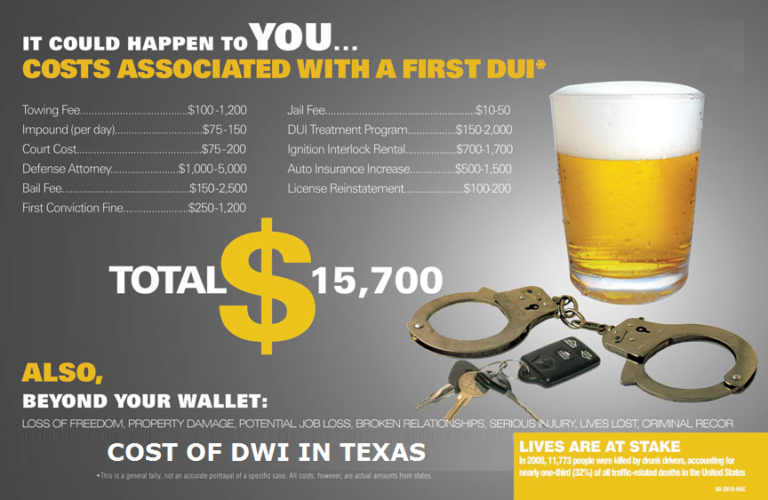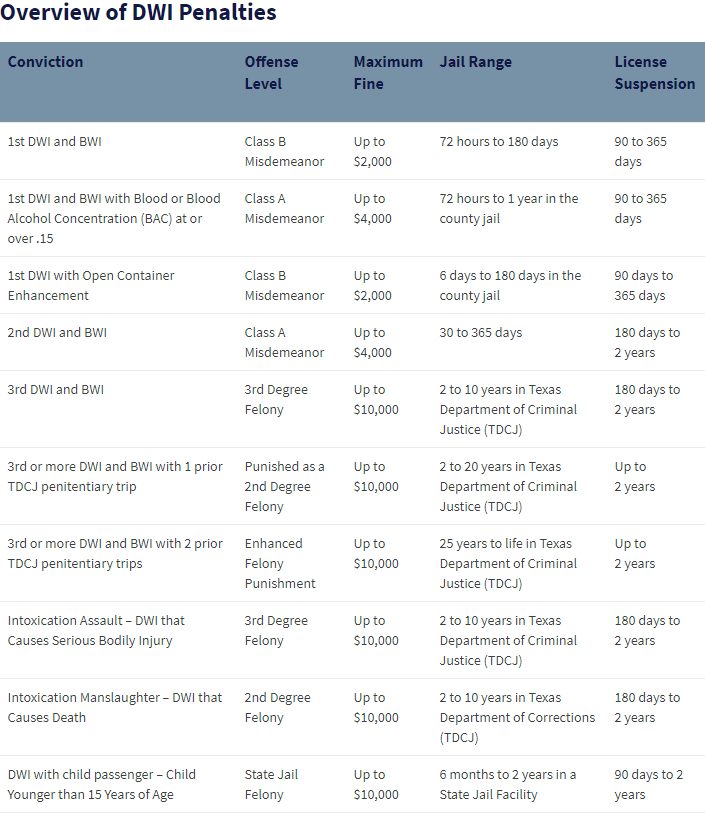What Is A Third Degree Dwi?
Did you know that it’s important to understand the different degrees of DWI charges? If you’ve ever wondered, “What Is a Third Degree DWI?” then you’re in the right place! Let’s dive in and learn more about this serious offense.
In simple terms, a third degree DWI refers to the severity level of a DWI charge. It means that the driver is being accused of operating a vehicle under the influence of alcohol or drugs, and their level of impairment is considered to be the third most severe. But what exactly does this entail?
When someone is charged with a third degree DWI, it typically means that they have previous DWI convictions on their record or have committed an aggravated offense. This means that the consequences of a third degree DWI are more severe than those of a first or second degree DWI. Let’s take a closer look at the specific penalties and implications associated with a third degree DWI charge.
[Remember to include relevant subheadings to optimize for SEO.]

Understanding the Third Degree DWI Charge
When it comes to driving under the influence, the consequences can vary depending on the severity and circumstances of the offense. One such charge is the Third Degree DWI, which carries its own set of penalties and considerations. In this article, we will delve into what exactly a Third Degree DWI entails, the potential consequences, and how it differs from other DWI charges. Whether you are facing this charge yourself or simply curious about the legal implications, read on to gain a comprehensive understanding of the Third Degree DWI charge.
What Is a Third Degree DWI?
The Third Degree DWI charge refers to a specific classification of driving while intoxicated cases. In general, a person is charged with Third Degree DWI when they are found to be operating a motor vehicle under the influence of alcohol, drugs, or a combination of both. This charge is commonly associated with a blood alcohol concentration (BAC) level between 0.08% and 0.15%. It is important to note that the legal limit for BAC may vary by jurisdiction, so it is essential to be aware of the laws specific to your area.
Understanding the Elements of a Third Degree DWI Charge
To fully grasp the nature of a Third Degree DWI charge, it is crucial to understand the elements that must be present for this offense to be established. While the specific elements can differ based on jurisdiction, there are generally a few common factors involved:
- Operation of a motor vehicle: The first element is the operation or control of a motor vehicle by the accused individual. This can include driving, being in physical control of the vehicle, or even having the ability to operate the vehicle.
- Proof of impairment: The prosecution must provide evidence of impairment, typically through standardized field sobriety tests, chemical tests such as breathalyzer or blood tests, and observations made by law enforcement officers.
- BAC above the legal limit: For a Third Degree DWI charge, the BAC level is typically in the range of 0.08% to 0.15%, although this may vary depending on local laws.
These elements must be established beyond a reasonable doubt in order for a Third Degree DWI charge to be upheld in court.
The Potential Consequences of a Third Degree DWI Charge
Being convicted of a Third Degree DWI charge can have serious consequences that can impact various aspects of your life. The specific penalties can vary depending on the jurisdiction and individual circumstances, but common consequences include:
- Driver’s license suspension: Upon conviction, your driver’s license may be suspended for a certain period of time.
- Probation: It is not uncommon for a Third Degree DWI conviction to result in a probationary period, during which you are required to adhere to specific conditions set by the court.
- Monetary fines: A Third Degree DWI charge often comes with hefty fines that can range from hundreds to thousands of dollars.
- Alcohol education and treatment: In some cases, individuals convicted of a Third Degree DWI may be required to attend alcohol or drug education programs or undergo treatment for substance abuse.
- Ignition interlock device: Depending on the jurisdiction, individuals convicted of a Third Degree DWI may be required to install an ignition interlock device in their vehicle, which requires a breathalyzer test before the vehicle can be started.
These are just a few examples of the potential consequences associated with a Third Degree DWI charge. It is recommended to consult with a legal professional to better understand the specific penalties that may be applicable in your jurisdiction.
How Does a Third Degree DWI Differ from Other DWI Charges?
While all DWI charges are serious offenses, there are distinctions between the various degrees of DWI charges. It is important to understand these differences to gain a clearer picture of the potential consequences you may face. Here are a few key differentiators between Third Degree DWI and other types of DWI charges:
First Degree DWI vs. Third Degree DWI
A First Degree DWI charge is typically the most severe level of DWI offense. It is reserved for cases involving aggravating factors such as prior DWI convictions, excessive levels of impairment, or incidents resulting in serious bodily harm or death. In contrast, a Third Degree DWI charge does not involve the same level of aggravation and is typically considered a less severe offense.
Second Degree DWI vs. Third Degree DWI
A Second Degree DWI charge falls in between First Degree and Third Degree DWI charges in terms of severity. It may involve aggravating factors that are not present in a Third Degree DWI case but do not meet the threshold for a First Degree DWI. Second Degree DWI charges can arise from factors such as prior DWI convictions, refusal to submit to chemical tests, or operating a vehicle with a BAC above a certain threshold.
Third Degree DWI vs. Fourth Degree DWI
The main difference between Third Degree and Fourth Degree DWI charges lies in the level of impairment. A Fourth Degree DWI charge typically involves a lower BAC level, usually ranging from 0.04% to 0.08%. Additionally, a Fourth Degree DWI may involve aggravating factors, similar to a Third Degree DWI charge, but with a lower level of impairment.
The Importance of Seeking Legal Counsel
If you are facing a Third Degree DWI charge, it is highly recommended to seek the guidance of a qualified attorney who specializes in DWI cases. A legal professional can assess the details of your case, navigate the complex legal process, and work towards the best possible outcome. They can also provide guidance on potential defenses, negotiate on your behalf, and ensure that your rights are protected throughout the proceedings.
Taking Steps Towards a Positive Outcome
Dealing with a Third Degree DWI charge can be incredibly daunting, but remember that there is hope for a positive outcome. By taking the charge seriously, seeking legal counsel, and being proactive in addressing any underlying issues related to alcohol or substance abuse, you can navigate this challenging situation and move forward towards a brighter future. Remember, everyone makes mistakes, and it is how we learn from and rectify those mistakes that truly matter.
Key Takeaways: What Is a Third Degree DWI?
- A third degree DWI refers to a charge of driving while impaired, often due to alcohol or drugs.
- It is considered a serious offense and can have severe legal consequences.
- Convictions for third degree DWI typically result in fines, license suspension, and possible jail time.
- Repeat offenders may face more severe penalties, including mandatory ignition interlock device installation.
- It is crucial to seek legal advice and support if you are facing a third degree DWI charge.
Frequently Asked Questions
Welcome to our FAQ section on understanding Third Degree DWI charges. Here you will find answers to common questions related to this topic. Whether you’re looking for information on penalties, legal terminology, or the consequences of a Third Degree DWI, we’ve got you covered.
1. What are the potential penalties for a Third Degree DWI?
A Third Degree DWI, also known as a “gross misdemeanor” in many states, carries serious consequences. Penalties can vary depending on the specific jurisdiction, but they often include fines, probation, license suspension, mandatory alcohol education programs, and even jail time. The specific penalties may also be influenced by factors such as prior convictions and the level of impairment.
It is important to consult with a legal professional or attorney to understand the potential penalties you may face based on the laws in your jurisdiction. They can provide guidance and help you navigate the legal process.
2. How is a Third Degree DWI different from other types of DWI charges?
A Third Degree DWI is typically considered less severe than First Degree and Second Degree DWI charges. The classification and distinction may vary depending on the state or jurisdiction, but in general, Third Degree DWI is charged when the driver is found to have a lower level of impairment or a lower Blood Alcohol Concentration (BAC) than in more serious DWI offenses.
While First and Second Degree DWI charges often involve higher levels of intoxication, multiple prior offenses, or certain aggravating factors, a Third Degree DWI typically involves a lower BAC or a first-time offense. However, it is important to understand that even a Third Degree DWI charge can have significant consequences, and legal assistance should be sought.
3. Can I refuse to take a breathalyzer test in a Third Degree DWI case?
In many jurisdictions, the law allows drivers to refuse a breathalyzer test, but consequences may follow. In some states, refusing a breathalyzer can result in immediate license suspension, regardless of the DWI charges. This is often referred to as the “implied consent” law. It’s important to understand the specific laws in your jurisdiction and consult with a legal professional to determine the best course of action.
Keep in mind that refusing a breathalyzer test does not guarantee you will avoid a DWI charge. Law enforcement can still use other evidence, such as field sobriety tests or witness testimony, to establish impairment and pursue charges.
4. Will a Third Degree DWI charge appear on my criminal record?
A Third Degree DWI charge can potentially appear on your criminal record, depending on the laws in your jurisdiction and the outcome of the case. In many states, DWI offenses are considered criminal offenses and can have long-term implications. A conviction can affect employment opportunities, housing applications, and other areas where a criminal background check is required.
It is important to consult with an attorney to understand the potential impact on your criminal record and explore possible defense strategies that may help mitigate the consequences.
5. How can I defend against a Third Degree DWI charge?
Defending against a Third Degree DWI charge requires a thorough understanding of the laws in your jurisdiction and the specific circumstances of your case. A defense strategy may involve challenging the validity of the traffic stop, questioning the accuracy of BAC test results, or presenting evidence that challenges the allegations of impairment.
Seeking legal representation is crucial to help you navigate the legal complexities and develop an effective defense. An experienced attorney can review the details of your case, identify potential weaknesses in the prosecution’s evidence, and advocate for your rights in court. It’s essential to consult with an attorney as early in the process as possible to ensure the best possible outcome for your case.
Summary
So, remember, a third-degree DWI is a serious offense because it means you have been caught driving while impaired for the third time. It can result in heavy fines, license suspension, and even jail time. We learned that intoxication can be caused by alcohol, drugs, or a combination of both. It is important to never drink and drive or get behind the wheel after using drugs.
In this article, we also discussed the legal blood alcohol concentration (BAC) limit for driving, which is 0.08% for adults. Anything above this level can lead to a DWI charge. We also talked about the potential consequences of a third-degree DWI, such as increased fines and longer license suspensions. It is essential to understand that driving while impaired not only puts your life at risk but also endangers the lives of others on the road. Always make safe choices and find alternative transportation if you are impaired. Stay safe out there!






